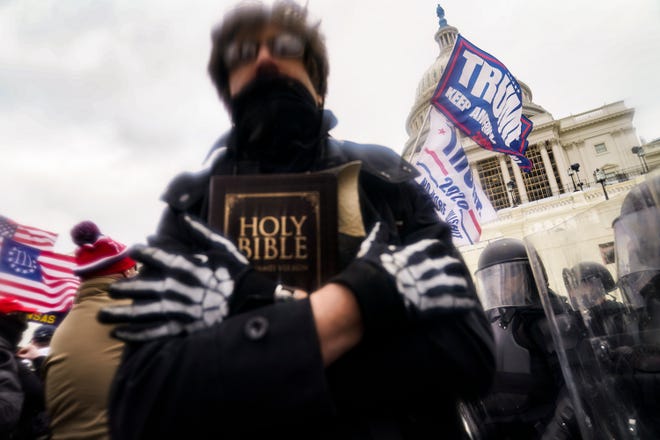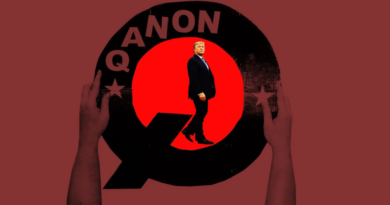White nationalists are once again using Christian symbols to spread hate
WASHINGTON — A screaming man with his fist raised, a Byzantine cross emblazoned in red on his T-shirt. A white flag with a lone green pine tree and the words “An Appeal to Heaven” fluttering over the angry crowd. The Christian flag whipping in the wind from a parked pickup.
Those images on display at the Jan. 5-6 rally and riot in Washington, D.C., have raised concerns that some of former President Donald Trump’s most ardent and dangerous supporters, including groups such as the Proud Boys, Oathkeepers, QAnon, 3 Percenters and America Firsters, are cloaking themselves in Biblical language to justify their actions.
The flags and other displays are the latest examples of how white terrorists throughout history, including the KKK, have cited Christianity to justify what they claim is their god-given right to control races and ethnic groups, experts said.
The displays — including a prayer from the Senate rostrum by a QAnon shaman who broke into the Capitol — have so alarmed some faith leaders that they published an open letter Friday signed by more than 1,400 pastors and church leaders condemning the “perversion” of their faith.
“The use of Christian symbols, iconography, scripture in efforts to dominate and exclude are as old the republic itself,” said the Rev. Fred Davie, executive vice president of Union Theological Seminary in New York City. “It’s deeply baked into our nation. It’s deep, but it’s also been proven time and time again to be wrong.”

Davie, who served as a faith liaison in the Obama White House, said evangelicalism, in particular, has become associated with American nationalism, specifically white nationalism. Online, some hard-right Christians find acceptance for their racist beliefs from white nationalists, most of whom don’t share their faith but are united in their hatred.
“We’re talking about a minority within a minority, but it is a powerful minority,” Davie said. “But they do not represent the essence of white Christians in America — or Christians in America overall.”
Using Christianity to justify hate
Some of the people who display Christian symbols or invoke the Bible to justify their actions are doing it in a largely cynical way, several experts said: They’re sending a signal to fellow racists.
“For them, it’s just shorthand for identity,” said Edward Ahmed Mitchell, deputy executive director of the Council on American-Islamic Relations and a former prosecutor in Georgia. “There absolutely is a connection between far-right political extremism and far-right religious extremism, but I doubt these people are showing up at church every Sunday and reading their Bibles.”
Matthew DeMichele, a research sociologist who specializes in extremism at the research institute RTI International in Raleigh, North Carolina, said there are clearly Christians who believe their religion justifies racism, and today’s displays are an “intense redeployment of old tactics.”
For centuries in the United States, many Christian pastors preached a “natural order” where whites were justified in enslaving Black men, women and children, citing everything from the writings of Paul the Apostle in the New Testament to the Curse of Ham in the Old Testament. Others argued that since the Bible refers to slavery as an institution without specifically condemning it, it must be divinely permitted. In 1861, Texas’ leaders cited the “plainest revelations of Divine Law” to justify slavery and secession from the United States.
DeMichele said what we’re seeing today is a tweaked re-emergence of the approach used by groups like the KKK, which cloaked themselves in Christian symbols and set crosses on fire as a terror tactic.
‘Unthinkable for Christians to support the Proud Boys’
The letter published this week by Christian leaders from across the political spectrum specifically acknowledges that terror groups like the KKK have been tolerated and even accommodated by white evangelicals.
“We choose to speak out now because we do not want to be quiet accomplices in this on-going sin,” the letter reads. “Just as it was tragically inconsistent for Christians in the 20th Century to support the Ku Klux Klan and Nazi ideology, it is unthinkable for Christians to support the Proud Boys, Oathkeepers, QAnon, 3 Percenters, America Firsters, and similar groups.”
The letter urges pastors to counsel parishioners who align with or support racist and hate groups, and to emphasize the values of democracy, anti-racism and equality.
“Instead of seeing any particular political leader or party as divinely appointed, we believe in the prophetic and pastoral ministry of the church to all political leaders and parties,” the letter reads. “Instead of power through violence, we believe in and seek to imitate the powerful, servant love practiced by our Lord and Savior Jesus Christ.”
DeMichele, who has interviewed dozens of white supremacists, said the United States has deliberately been reluctant to investigate why and how people become white supremacists and white nationalists. He said a better understanding of why white Americans become enamored with those ideals will help combat domestic terrorism and help the United States live up to its ideals.
“People don’t want to say that this is a country founded on white supremacy. But we know that to be true,” DeMichele said. “It’s very important to understand that it’s not new for white supremacists to have a Christian identity. But it is intriguing there has been the strengthening overlap of the white nationalists and those of Christian identity.”
White nationalists generally claim the white race is superior and advocate for racial segregation. White supremacists go a step further by insisting that white people deserve to be in charge of everything because of their skin color. The two descriptions are often used interchangeably by the public, although scholars draw a distinction between the two.
Davis noted Christian symbols have had a visible presence at other white nationalist rallies in recent years, including the Charlottesville “Unite the Right” march in August 2017, where a mishmash of hundreds of white nationalists, Neo Nazis, the KKK and white militias protested the removal of a statue of Confederate general Robert E. Lee.
A similar hodgepodge of groups converged on the Capitol Jan. 6, including white nationalists, QAnon adherents, Oathkeepers and others brandishing Christian flags and blowing ram’s horns.
“The differing ideologies are all kind of blending together,” said Stephen Piggott, a researcher with the Western States Center, a Portland, Oregon-based nonprofit that supports inclusive democracy. “A year ago, if a Neo-Nazi showed up at a Trump rally they’d likely get kicked out.”
Turning religious beliefs ‘into something very dark’
White nationalists internationally have similarly invoked Christianity to justify their actions — even when they aren’t Christian themselves. A man who attacked a summer camp in Norway in 2011, killing 77 people, claimed to be a member of an international Christian military order created to fight Muslims. He later said he was actually a follower of pagan Norse gods, including Odin, and a neo-Nazi, and that he had drawn inspiration from Al Qaeda.
Comparisons between Al Qaeda and white nationalists who profess a twisted, extreme version of Christianity are apt, said Javed Ali, a former FBI and National Security Council analyst. Terror groups such as Al Qaeda and ISIS both have cherry-picked from Islam to justify their violent attacks, said Ali, who teaches counterterrorism at the University of Michigan’s Gerald R. Ford School of Public Policy.
“They were able to turn Islam into something very dark,” he said. “I see the same thing playing out in the far-right space: These symbols are being hijacked for a completely different purpose. And it helps justify their actions.”
While Christian symbols were present during the Jan. 6 riot at the Capitol, prosecutors have not indicated any significant links between arrested participants and churches. Mitchell, of the Council on American-Islamic Relations, said federal agents should not target churches for investigation, the way they targeted mosques after 9/11. Critics of that surveillance said it risked alienating and potentially radicalizing Muslims who suddenly felt unwelcome in their own country.
“You don’t have to go investigating churches. All you have to do is take seriously the violent rhetoric that’s being expressed out in the open,” he said. “The federal government, in our opinion, has never taken the threat of far-right religious extremists as seriously as they have Muslim extremists, who are far fewer.”
*** This article has been archived for your research. The original version from USA TODAY can be found here ***


